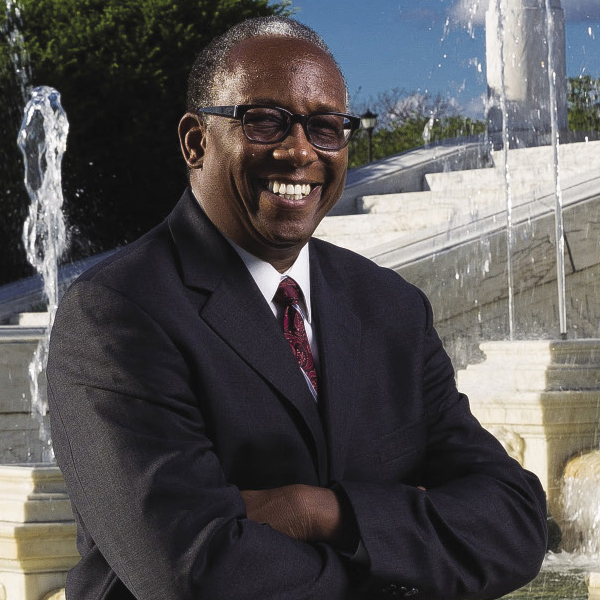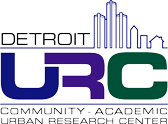Detroit URC Board Partner Spotlight: An interview with Guy O. Williams, President and CEO of Detroiters Working for Environmental Justice
 Detroiters Working for Environmental Justice (DWEJ) envisions Detroit as the global model of a vibrant urban center where all thrive in environmental, economic and social health.
Detroiters Working for Environmental Justice (DWEJ) envisions Detroit as the global model of a vibrant urban center where all thrive in environmental, economic and social health.
DWEJ champions local and national collaboration, including membership on the Detroit URC Board, to advance environmental justice and sustainable redevelopment. President and CEO Guy O. Williams recently spoke with us about DWEJ’s work and involvement in community-based participatory research (CBPR).
How does your involvement in community-based participatory research with the Detroit URC help you achieve DWEJ’s mission to promote environmental justice?
One of the most important tenants of environmental justice is that people in communities have a voice in governance and key decisions that affect their lives. We feel that CBPR helps ground the research in authentic issues and makes the outcome and the practicality of using that information more likely.
As an organization, DWEJ strives to be a credible source of good science around our issues. Partnering with the Detroit URC and the University of Michigan on these projects strengthens our organization’s work. A great example of this is our most recent opportunities to partner with public health researchers. Last year I worked with Stuart Batterman and Sheena Martenies on research under Community Approaches to Promoting Healthy Environments (CAPHE ) (an affiliated partnership of the Detroit URC). Our ability to participate in this primary research is very important to giving us a credible voice in the policy arena.
How do you use that voice to advocate for policy change?
In environmental laws, typically you have a hierarchy of federal, state, and local law. It’s important to communicate with the elected officials who are making policies and help them to see the impact of the current regulations. If we’re asking for change, we need to be able to show the pros and cons of those changes, and how they can be addressed. So my experience here is that we are more successful when we’re able to back up our arguments with data and research.
Conversely, there is a wide range of perspectives and ideologies in the environmental justice movement. My leadership of DWEJ tends to mirror my own experience as a professional in the field. As a result we’re more in the middle of the spectrum; we’re more of a mainstream voice than other organizations. Sometimes, even within the movement, we’re seen as not strident enough, or not trustworthy because we’re willing to talk to industry. But I believe that we have to work with the agents that are creating the problems.
Recently we conducted an economic study around the likely impact of our climate action plan recommendations. Because we find that when we can speak in economic terms, ears open a little bit more and the stereotypes are broken. So our partnership with the Detroit URC is an asset we hold in high regard. The University of Michigan is one of the top research universities in the country and when we can speak with shared voice, that’s very helpful.
What are your top priorities for the next year?
One of the things we’ve committed to doing this year is to educate the public about the principles of environmental justice. You can read about the principles on the DWEJ website at http://www.ejnet.org/ej/principles.html
We would also like to see an affordable water plan for the city. We know that the Detroit Water and Sewer Department will need to invest tens of millions of dollars in the next 18 years to deal with infrastructure. We also know there is a big conversation going on about infrastructure at the federal level. Our elected officials should be seeking opportunities and investment to address this problem. That has to be one of the highest priorities to fix. There’s no reason to be in the Great Lakes region and literally have tens of thousands of Detroiters without water. It’s unconscionable.
Another priority is changing how we deal with our land, and developing land use policies that become a conscious element of increasing wealth in the city for residents. Land that is held by the city government can be redistributed to people in a way that can be sustained by households. It’s a city that was built on households and for households, and we can stay true to that tradition. Through the current Sustainability Action Plan we can find ways of supporting housing affordability.
We do a lot of work around air quality, but I brought up these other issues first because these represent opportunities for the city government. It is important for Detroit to use its leverage to address water and land use for a positive change.




 Neighborhood Service Organization (NSO) provides services that have impacted countless children, youth, adults, seniors, families, and communities since 1955. As a member of the Detroit URC’s Board, NSO contributes to the development of new community-based participatory research projects, capacity building and related activities.
Neighborhood Service Organization (NSO) provides services that have impacted countless children, youth, adults, seniors, families, and communities since 1955. As a member of the Detroit URC’s Board, NSO contributes to the development of new community-based participatory research projects, capacity building and related activities.